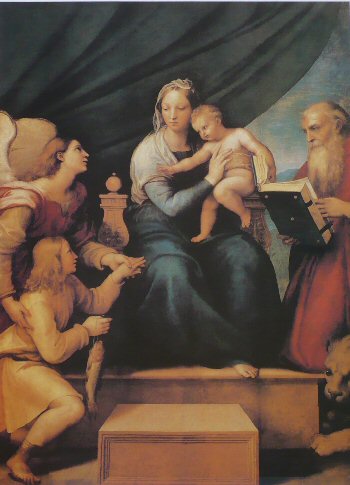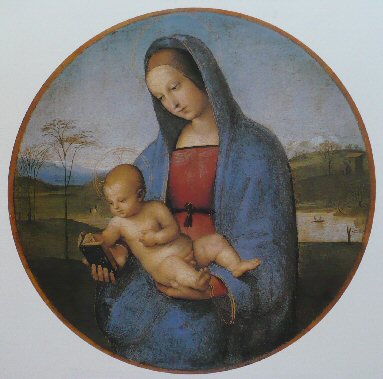 Mary
does not love us in jest but with a startling serious love. (1) St. Angela of Foligno
Mary
does not love us in jest but with a startling serious love. (1) St. Angela of FolignoVirgin Most Prudent . . .
Home Page
Mary
Introduction
Mary's Litany
Mary, your ways are true and lead directly to your Son. They point directly to the only important goal of our life. We can often become distracted by what the world offers for pleasure, peace, and happiness. Your way is simple, clear, wise and true. The Gospel message your Son announced contains the way you show us by your life. You cooperated at every moment to accept his grace and strength to do his will. We must place our minds and wills in your hands.
Mary gave birth to the Incarnate Word because of the love God the Father has for us. Mary is our mother. She exercises her sound judgment in the affairs of her children, protecting them from harm, offering them right spiritual direction, always leading them toward her son, and soliciting special graces and blessing for us on our journey to everlasting life.
 Mary
does not love us in jest but with a startling serious love. (1) St. Angela of Foligno
Mary
does not love us in jest but with a startling serious love. (1) St. Angela of Foligno
God, seeing us unworthy of receiving graces directly from him, gave them to Mary so that we receive from her everything he wants to give us. (2) St. Bernard-abbot of Clairvaux
Take shelter under our Lady’s mantle, and do not fear. She will give you all you need, she is very rich, and besides is so very generous with her children. So take advantage without fear and with complete confidence, whenever you need anything. She loves giving. (3) Blessed Mary Raphaela
It
is not without reason that Holy Church, in the words of Ecclesiastes calls Mary,
“The Mother of Holy Hope”. She is the mother who gives birth to holy hope in
our hearts, not to the vain and transitory goods of this life, but of the
eternal rewards of heaven.
(4) St. Alphonsus Liguori
While Peter has the keys of heaven, Mary has the key to God's heart; while Peter binds and looses, Mary also binds with the chains of love and looses with the gift of pardon. While Peter is the guardian and the minister of indulgences, Mary is the generous and wise treasurer of God's favors. (5) Pius XII, pope
Mary was always perfectly detached from earthly affection, looking upon the world as a desert, and therefore in no way relying either on creatures or on her own merits, but relying only on divine grace, in which was all her confidence, she always advanced in the love of God. (6) St. Alphonsus de Liguori
 Mary
ascended from the desert, that is, from the world, which she so fully renounced,
and so truly considered as a desert, that she turned all her affections from it.
She relied upon her Beloved, for she trusted not in her own merits, but in his
graces who bestows graces. (7) Ailgrino
Mary
ascended from the desert, that is, from the world, which she so fully renounced,
and so truly considered as a desert, that she turned all her affections from it.
She relied upon her Beloved, for she trusted not in her own merits, but in his
graces who bestows graces. (7) Ailgrino
The
Blessed Virgin was unwilling to reveal the secret of her pregnancy to Joseph,
lest she might seem to boast of her gifts; she therefore resigned herself to the
care of God, in the fullest confidence that he would guard her innocence and
reputation.
(8) Cornelius a Lapide
The holy Mother also showed how great was her confidence in divine Providence when she received notice from St. Joseph that they must fly into Egypt. On that very night she undertook so long a journey to a strange and unknown country without provisions, without money, accompanied only by her infant Jesus and her poor spouse, who arose and took the Child and his Mother by night, and retired into Egypt. (9) St. Alphonsus de Liguori
But much more did she show her confidence when she asked her Son for wine at the marriage-feast of Cana; for when she had said, They have no wine, Jesus answered her, Woman, what is it to thee and to me? My hour is not yet come. After this answer, which seemed an evident refusal, her confidence in the divine goodness was such that she desired the servants to do whatever her Son told them; for the favor was certain to be granted: Whatsoever He shall say to you, do ye. It indeed was so: Jesus Christ ordered the vessels to be filled with water, and changed it into wine. (10) St. Alphonsus de Liguori
Let us learn from Mary to have that confidence in God which we ought always to have, but principally in the great affair of our eternal salvation - an affair in which it is true that we must cooperate; yet it is from God alone that we must hope for the grace necessary to obtain it. (11) St. Alphonsus de Liguori
 O
salvation of all who call upon you, save me! (12) St. Bonaventure
O
salvation of all who call upon you, save me! (12) St. Bonaventure
In
the eyes of Mary, worldly riches were of no more value than dirt. She
always lived poor, and died poor; for at her death we do not know that she left
anything but two poor gowns to two women who had served her during her life.
(13) St. Alphonsus de Liguori
Mary is called by the Church not only a prudent Virgin, but most prudent, that we may understand that she is so full of grace and compassion, that she can supply all, without losing any herself. (14) Hugo of St. Victor
As all can go to and gather the fruit of an olive tree that is exposed in the midst of a plain; so all, both the just and sinners, can have recourse to Mary to obtain her mercy. (15) St. Antoninus
"They have no wine." Mary simply says this to Jesus. She doesn't ask for anything specific, much less that Jesus exercise his power, perform a miracle, produce wine. she simply hands the matter over to Jesus and leaves it to him to decide about what to do. In the simple words of the Mother of Jesus, we can see her affectionate concern for people, that maternal affection which makes her aware of the problems of others. We see her heartfelt goodness and her willingness to help. (16) Benedict XVI, pope
"They
have no wine." Mary leaves everything to the Lord's judgment. At
Nazareth she gave over her will, immersing it in the will of God: "Here am I,
the servant of the Lord; let it be with me according to your word." And
this continues to be her fundamental attitude. This is how she teaches us
to pray: not by seeking to assert before God our own will and our own desires,
however important they may be, however reasonable they might appear to us, but
rather to bring them before him and to let him decide what he intends to do.
(17) Benedict XVI, pope
Mary, the Mother of the Lord, has received from the faithful the title of Advocate: she is our advocate before God. And this is how we see her, from the wedding-feast of Cana onwards: as a woman who is kindly, filled with maternal concern and love, a woman who is attentive to the needs of others and, out of desire to help them, brings those needs before the Lord. (18) Benedict XVI, pope
Home Page
Mary
Introduction
Mary's Litany